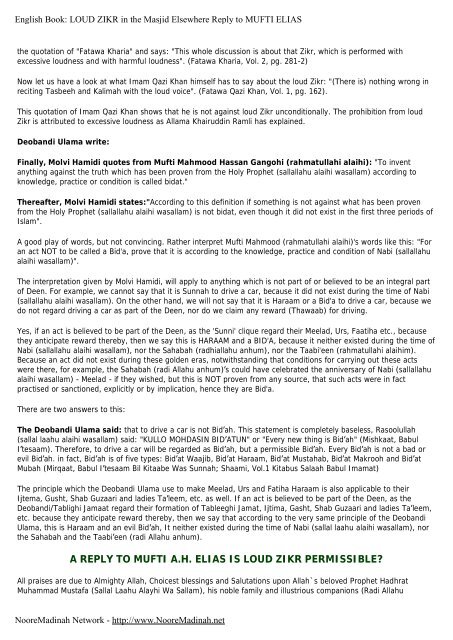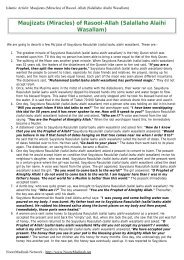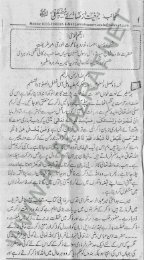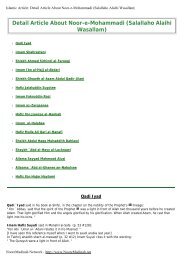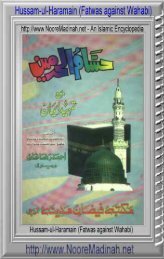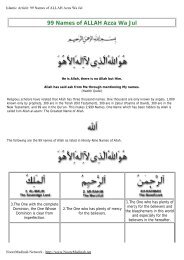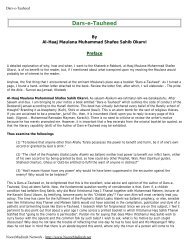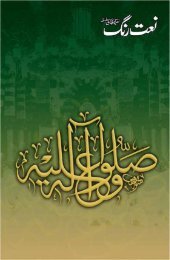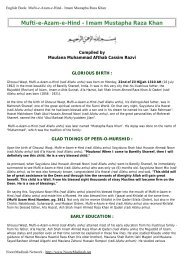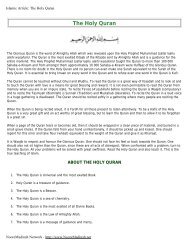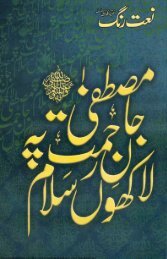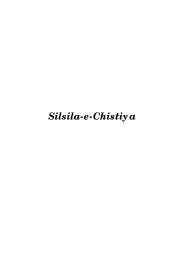LOUD ZIKR in the Masjid & Elsewhere & Reply to MUFTI ELIAS
LOUD ZIKR in the Masjid & Elsewhere & Reply to MUFTI ELIAS
LOUD ZIKR in the Masjid & Elsewhere & Reply to MUFTI ELIAS
Create successful ePaper yourself
Turn your PDF publications into a flip-book with our unique Google optimized e-Paper software.
English Book: <strong>LOUD</strong> <strong>ZIKR</strong> <strong>in</strong> <strong>the</strong> <strong>Masjid</strong> <strong>Elsewhere</strong> <strong>Reply</strong> <strong>to</strong> <strong>MUFTI</strong> <strong>ELIAS</strong><br />
<strong>the</strong> quotation of "Fatawa Kharia" and says: "This whole discussion is about that Zikr, which is performed with<br />
excessive loudness and with harmful loudness". (Fatawa Kharia, Vol. 2, pg. 281-2)<br />
Now let us have a look at what Imam Qazi Khan himself has <strong>to</strong> say about <strong>the</strong> loud Zikr: "(There is) noth<strong>in</strong>g wrong <strong>in</strong><br />
recit<strong>in</strong>g Tasbeeh and Kalimah with <strong>the</strong> loud voice". (Fatawa Qazi Khan, Vol. 1, pg. 162).<br />
This quotation of Imam Qazi Khan shows that he is not aga<strong>in</strong>st loud Zikr unconditionally. The prohibition from loud<br />
Zikr is attributed <strong>to</strong> excessive loudness as Allama Khairudd<strong>in</strong> Ramli has expla<strong>in</strong>ed.<br />
Deobandi Ulama write:<br />
F<strong>in</strong>ally, Molvi Hamidi quotes from Mufti Mahmood Hassan Gangohi (rahmatullahi alaihi): "To <strong>in</strong>vent<br />
anyth<strong>in</strong>g aga<strong>in</strong>st <strong>the</strong> truth which has been proven from <strong>the</strong> Holy Prophet (sallallahu alaihi wasallam) accord<strong>in</strong>g <strong>to</strong><br />
knowledge, practice or condition is called bidat."<br />
Thereafter, Molvi Hamidi states:"Accord<strong>in</strong>g <strong>to</strong> this def<strong>in</strong>ition if someth<strong>in</strong>g is not aga<strong>in</strong>st what has been proven<br />
from <strong>the</strong> Holy Prophet (sallallahu alaihi wasallam) is not bidat, even though it did not exist <strong>in</strong> <strong>the</strong> first three periods of<br />
Islam".<br />
A good play of words, but not conv<strong>in</strong>c<strong>in</strong>g. Ra<strong>the</strong>r <strong>in</strong>terpret Mufti Mahmood (rahmatullahi alaihi)'s words like this: "For<br />
an act NOT <strong>to</strong> be called a Bid'a, prove that it is accord<strong>in</strong>g <strong>to</strong> <strong>the</strong> knowledge, practice and condition of Nabi (sallallahu<br />
alaihi wasallam)".<br />
The <strong>in</strong>terpretation given by Molvi Hamidi, will apply <strong>to</strong> anyth<strong>in</strong>g which is not part of or believed <strong>to</strong> be an <strong>in</strong>tegral part<br />
of Deen. For example, we cannot say that it is Sunnah <strong>to</strong> drive a car, because it did not exist dur<strong>in</strong>g <strong>the</strong> time of Nabi<br />
(sallallahu alaihi wasallam). On <strong>the</strong> o<strong>the</strong>r hand, we will not say that it is Haraam or a Bid'a <strong>to</strong> drive a car, because we<br />
do not regard driv<strong>in</strong>g a car as part of <strong>the</strong> Deen, nor do we claim any reward (Thawaab) for driv<strong>in</strong>g.<br />
Yes, if an act is believed <strong>to</strong> be part of <strong>the</strong> Deen, as <strong>the</strong> 'Sunni' clique regard <strong>the</strong>ir Meelad, Urs, Faatiha etc., because<br />
<strong>the</strong>y anticipate reward <strong>the</strong>reby, <strong>the</strong>n we say this is HARAAM and a BID'A, because it nei<strong>the</strong>r existed dur<strong>in</strong>g <strong>the</strong> time of<br />
Nabi (sallallahu alaihi wasallam), nor <strong>the</strong> Sahabah (radhiallahu anhum), nor <strong>the</strong> Taabi'een (rahmatullahi alaihim).<br />
Because an act did not exist dur<strong>in</strong>g <strong>the</strong>se golden eras, notwithstand<strong>in</strong>g that conditions for carry<strong>in</strong>g out <strong>the</strong>se acts<br />
were <strong>the</strong>re, for example, <strong>the</strong> Sahabah (radi Allahu anhum)’s could have celebrated <strong>the</strong> anniversary of Nabi (sallallahu<br />
alaihi wasallam) - Meelad - if <strong>the</strong>y wished, but this is NOT proven from any source, that such acts were <strong>in</strong> fact<br />
practised or sanctioned, explicitly or by implication, hence <strong>the</strong>y are Bid'a.<br />
There are two answers <strong>to</strong> this:<br />
The Deobandi Ulama said: that <strong>to</strong> drive a car is not Bid’ah. This statement is completely baseless, Rasoolullah<br />
(sallal laahu alaihi wasallam) said: "KULLO MOHDASIN BID’ATUN" or "Every new th<strong>in</strong>g is Bid’ah" (Mishkaat, Babul<br />
I’tesaam). Therefore, <strong>to</strong> drive a car will be regarded as Bid’ah, but a permissible Bid’ah. Every Bid’ah is not a bad or<br />
evil Bid’ah. <strong>in</strong> fact, Bid’ah is of five types: Bid’at Waajib, Bid’at Haraam, Bid’at Mustahab, Bid’at Makrooh and Bid’at<br />
Mubah (Mirqaat, Babul I’tesaam Bil Kitaabe Was Sunnah; Shaami, Vol.1 Kitabus Salaah Babul Imamat)<br />
The pr<strong>in</strong>ciple which <strong>the</strong> Deobandi Ulama use <strong>to</strong> make Meelad, Urs and Fatiha Haraam is also applicable <strong>to</strong> <strong>the</strong>ir<br />
Ijtema, Gusht, Shab Guzaari and ladies Ta’leem, etc. as well. If an act is believed <strong>to</strong> be part of <strong>the</strong> Deen, as <strong>the</strong><br />
Deobandi/Tablighi Jamaat regard <strong>the</strong>ir formation of Tableeghi Jamat, Ijtima, Gasht, Shab Guzaari and ladies Ta’leem,<br />
etc. because <strong>the</strong>y anticipate reward <strong>the</strong>reby, <strong>the</strong>n we say that accord<strong>in</strong>g <strong>to</strong> <strong>the</strong> very same pr<strong>in</strong>ciple of <strong>the</strong> Deobandi<br />
Ulama, this is Haraam and an evil Bid’ah, It nei<strong>the</strong>r existed dur<strong>in</strong>g <strong>the</strong> time of Nabi (sallal laahu alaihi wasallam), nor<br />
<strong>the</strong> Sahabah and <strong>the</strong> Taabi’een (radi Allahu anhum).<br />
A REPLY TO <strong>MUFTI</strong> A.H. <strong>ELIAS</strong> IS <strong>LOUD</strong> <strong>ZIKR</strong> PERMISSIBLE?<br />
All praises are due <strong>to</strong> Almighty Allah, Choicest bless<strong>in</strong>gs and Salutations upon Allah`s beloved Prophet Hadhrat<br />
Muhammad Mustafa (Sallal Laahu Alayhi Wa Sallam), his noble family and illustrious companions (Radi Allahu<br />
NooreMad<strong>in</strong>ah Network - http://www.NooreMad<strong>in</strong>ah.net


